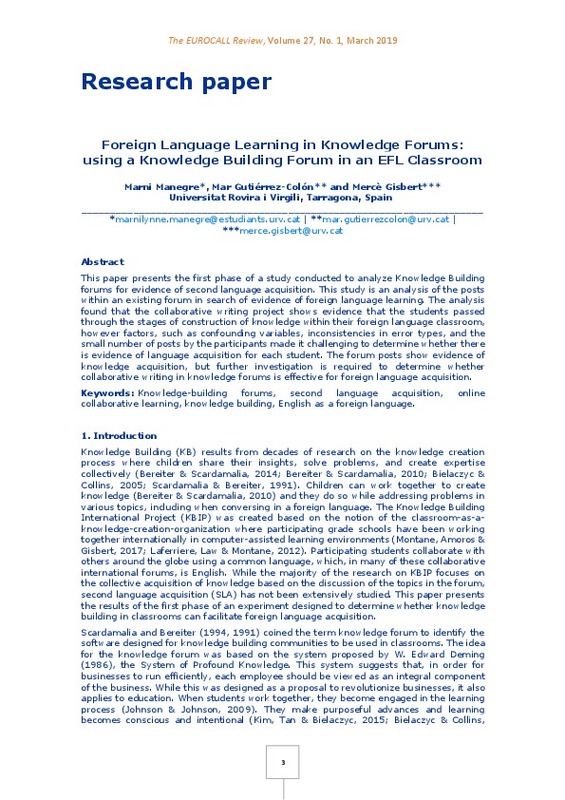Al-Jarf, R. (2007). Teaching Vocabulary to EFL College Students Online. CALL-EJ, 8(2). 1-16. http://econf.uob.edu.bh/conf1/pdf%20files/133.pdf
Bielaczyc, K. & Collins, A. (2005). Technology as a catalyst for fostering knowledge-creating communities. A. M. O'Donnell, C. E. Hmelo-Silver & J. van der Linden (Eds.), Using technology to enhance learning. Mahwah NJ: Lawrence Erlbaum Associates.
Bielaczyc, K. & Collins, A. (2006). Fostering knowledge-creating communities. A. M. O'Donnell, C. E. Hmelo-Silver & G. Erkens (Eds.), Collaborative Learning, Reasoning, and Technology. Mahwah NJ: Lawrence Erlbaum Associates.
[+]
Al-Jarf, R. (2007). Teaching Vocabulary to EFL College Students Online. CALL-EJ, 8(2). 1-16. http://econf.uob.edu.bh/conf1/pdf%20files/133.pdf
Bielaczyc, K. & Collins, A. (2005). Technology as a catalyst for fostering knowledge-creating communities. A. M. O'Donnell, C. E. Hmelo-Silver & J. van der Linden (Eds.), Using technology to enhance learning. Mahwah NJ: Lawrence Erlbaum Associates.
Bielaczyc, K. & Collins, A. (2006). Fostering knowledge-creating communities. A. M. O'Donnell, C. E. Hmelo-Silver & G. Erkens (Eds.), Collaborative Learning, Reasoning, and Technology. Mahwah NJ: Lawrence Erlbaum Associates.
Bereiter, C. & Scardamalia, M. (2010). Can Children Really Create Knowledge?. Canadian Journal of Learning and Technology / La revue canadienne de l'apprentissage et de la technologie, 36 (1). Canadian Network for Innovation in Education. https://doi.org/10.21432/T2ZP43
Bereiter C., Scardamalia M. (2014) Knowledge Building and Knowledge Creation: One Concept, Two Hills to Climb. In: Tan S., So H., Yeo J. (Eds.) Knowledge Creation in Education. Education Innovation Series, pp. 35-52. Singapore: Springer. https://doi.org/10.1007/978-981-287-047-6_3
Bikowski, D. & Vithanage, R. (2016). Effects of Web-Based Collaborative Writing on Individual L2 writing Development. Language Learning & Technology, 20(1), 79-99. https://scholarspace.manoa.hawaii.edu/bitstream/10125/44447/1/20_01_bikowskivithanage.pdf
Brantlinger, E., Jimenez, R., Klinger, J., Pugach, M. & Richardson, V. (2005). Qualitative Studies in Special Education. Exceptional Children. 71(2), 195-207. https://doi.org/10.1177/001440290507100205
Chen-Chung, L., Pin-Ching, W. & Shu-Ju, T., (2016). An analysis of student engagement patterns in language learning facilitated by Web 2.0 Technologies. ReCALL 28(2), 104- 122. https://doi.org/10.1017/S095834401600001X
Chuy, M., Scardamalia, M., Bereiter, C., Prinsen, F., Resendes, M., Messina, R., Hunsburger, W., Teplovs, C., & Chow, A. (2010). Understanding the nature of science and scientific process: A theory building approach. Canadian Journal of Learning and Technology, 36(1). https://doi.org/10.21432/T2GP4R
Cingel, D. P. & Sundar, S. (2012). Texting, techspeak, and tweens: The relationship between text messaging and English grammar skills. New Media & Society. 14(8).https://journals.sagepub.com/doi/10.1177/1461444812442927. https://doi.org/10.1177/1461444812442927
Comas-Quinn, A., Mardomingo, R. & Valentine, C. (2009). Mobile blogs in language learning: Making the most of informal and situated learning opportunities. ReCALL 21(1), 96-112. https://doi.org/10.1017/S0958344009000032
Consell Superior d'Avaluació del Sistema Educatiu (2015). Avaluació del projecte COMconèixer. Barcelona, Departament d'Ensenyament, Consell Superior d'Avaluació del Sistema Educatiu, col·lecció 'Documents' 32. http://cdl3.cdl.cat/COMconeixer/docs/Avaluacio_Projecte_COMconeixer.pdf
Cook, J. & Smith, M. (2004). Beyond formal learning: Informal community eLearning. Computers & Education. 43(1-2), 35-47. https://doi.org/10.1016/j.compedu.2003.12.003
Deming, W. E. (1986). Out of the Crisis. MIT Press.
Gunawardena, C. N, Lowe, C. A., & Anderson, T. (1997). Analysis of a Global Online Debate and the Development of an Interaction Analysis Model for Examining Social Construction of Knowledge in Computer Conferencing. Journal of Educational Computing Research. 17(4). https://doi.org/10.2190/7MQV-X9UJ-C7Q3-NRAG
Heiser, S., Stickler, U. & Furnborough, C. (2013). Student training in the use of an online synchronous conferencing tool. CALICO Journal, 30(2), 226-251. https://doi.org/10.11139/cj.30.2.226-251
Johnson, D.W. & Johnson, R.T. (1999). Making cooperative learning work, Theory Into Practice, 38:2, 67-73. https://doi.org/10.1080/00405849909543834
Kim, B., Tan, L., & Bielaczyc, K. (2015). Learner-generated designs in participatory culture: What they are and how they are shaping learning. Interactive Learning Environments, 23(5), 545-555. https://doi.org/10.1080/10494820.2015.1067974
Kimmerle, J., Moskaliuk, J., Brendle, D. & Cress, U. (2017). All in Good Time: Knowledge Introduction, Restructuring, and Development of Shared Opinions as Different Stages in Collaborative Writing. International Journal of Computer Supported Collaborative Learning. 12(2), 195-213. https://doi.org/10.1007/s11412-017-9258-6
Laferriere, T., Law, N. & Montaine, M. (2012). An International Knowledge Building Network for Sustainable Curriculum and Pedagogical Information. International Education Studies, 5(3), 148-160. https://doi.org/10.5539/ies.v5n3p148
Montane, M., Amaros, C. & Gisbert, M. (2017). The COMknowledge project: evaluation of methodological aspects of the project based on pupils' perceptions. Unpublished conference paper.
Moss, J. & Beatty, R. (2006). Knowledge building in mathematics: Supporting collaborative learning in pattern problems. International Journal of Computer Supported Collaborative Learning, 1(4), 441- 465. https://doi.org/10.1007/s11412-006-9003-z
Nami, F, Marandi, S.S., Sotoudehnama, E., (2018). Interaction in a discussion list: An exploration of cognitive, social, and teaching presence in teachers' online collaborations. ReCALL,30(3), 375-398. https://doi.org/10.1017/S0958344017000349
Paavola, S., Lipponen, L. & Hakkarainen, K. (2004). Models of Innovative Knowledge Communities and Three Metaphors of Learning. Review of Educational Research. 74(4), 557-576. https://doi.org/10.3102/00346543074004557
Scardamalia, M. & Bereiter, C. (1991). Higher levels of agency for children in knowledge building: A challenge for the design of new knowledge media. Journal of the Learning Sciences, 1,37-68. https://doi.org/10.1207/s15327809jls0101_3
Scardamalia, M. & Bereiter, C. (1994). Computer Support for Knowledge Based Communities. Journal of the Learning Sciences 3(3), 265-283. https://doi.org/10.1207/s15327809jls0303_3
Scardamalia, M. & Bereiter, C. (2006). Knowledge building: Theory, Pedagogy, and Technology. In K. Sawyer (Ed.) Cambridge Handbook of the Learning Sciences, pp. 97-118. New York: Cambridge University Press. https://doi.org/10.1017/CBO9781139519526.025
Scardamalia, M., Bereiter, C., Brett, C., Burtis, P.J., Calhoun, C., & Smith Lea, N. (1992). Educational applications of networked communal database. Interactive Learning Environments. 2(1), 45-71. https://doi.org/10.1080/1049482920020105
Sun, Y., Franklin, T. & Gao, F. (2015). Learning Outside of Classroom: Exploring the Active Part of an Informal Online English Learning Community in China. British Journal of Educational Technology. https://doi.org/10.1111/bjet.12340
Thorne, S., Black, R. W. & Sykes, J. M. (2009). Second language use, socialization, and learning in internet interest communities and online gaming. The Modern Language Journal, 93(1), 802-821. https://doi.org/10.1111/j.1540-4781.2009.00974.x
Yim, S., Warschauer, M., (2017). Web-Based Collaborative Writing in L2 Contexts: Methodological Insights From Text Mining. Language Learning & Technology, 21(1), 146-165. https://scholarspace.manoa.hawaii.edu/bitstream/10125/44599/1/21_01_yimwarschauer.pdf
Zhan, Z., Xu, F. & Ye, H. (2011). Effects of an online learning community on active and reflective learners' learning performance and attitudes in a face-to-face undergraduate course. Computers & Education, 56(4), 961- 968. https://doi.org/10.1016/j.compedu.2010.11.012
[-]








